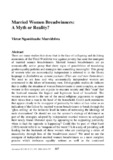Please use this identifier to cite or link to this item:
https://cris.library.msu.ac.zw//handle/11408/1185Full metadata record
| DC Field | Value | Language |
|---|---|---|
| dc.contributor.author | Muzvidziwa, Victor N. | en_US |
| dc.date.accessioned | 2016-05-03T15:47:45Z | - |
| dc.date.available | 2016-05-03T15:47:45Z | - |
| dc.date.issued | 2013 | - |
| dc.identifier.issn | 1023-1757 | - |
| dc.identifier.uri | http://hdl.handle.net/11408/1185 | - |
| dc.description.abstract | There are many studies that show that in the face of collapsing and declining economies of the Third World the war against poverty has seen the emergent of married women breadwinners. Married women breadwinners are an economically active group that show signs of possibilities of translating gender equality policies and strategies into something meaningful. This group of women who are economically independent is referred to in the Shona language in Zimbabwe as varume pachavo (They are real men themselves). We need to ask how and why economically independent women are constructed in the idiom of honorary men. Ethnographic studies do indicate that in reality the situation of women breadwinners is more complex, as more women in this category are at pains to reassure society and their ‘man’ that the husband remains the logical and legitimate head of household. The women even resort to the use of the moral-religious arguments to support their views that a man is the head of the household. Could such statements that appear clearly to be in support of patriarchy be taken at face value as an indication of the failure by married women breadwinners to break through the ‘glass ceiling’ at the domestic level in terms of redressing the ideology of male domination? Or should we see the women’s strategy of deferment as part of the strategies adopted by independent married women to safeguard their newly found liberated space by appearing to be supporting patriarchy when in fact the opposite is happening? Could this be part of what Scott (1985) would refer to as ‘weapons of the weak’? Is it a way of providing soft landing for the husbands of these women who are undergoing a crisis of masculinity through loss of the breadwinner status? We need to see the emergent of independent married women breadwinners as a more complex process which embraces equality notions as well as the continued subordination of women at the domestic and public domains. The article also explores Nuttall’s notion of entanglement and how this can explain the sociocultural and economic specificities of married women breadwinners. | en_US |
| dc.language.iso | en | en_US |
| dc.publisher | CSSALL Publishers | en_US |
| dc.relation.ispartofseries | Alternation;Vol. 20, no. 2 | - |
| dc.subject | Poverty | en_US |
| dc.subject | Women Breadwinners | en_US |
| dc.subject | Married women | en_US |
| dc.subject | household | en_US |
| dc.subject | subordination | en_US |
| dc.subject | Gender violence | en_US |
| dc.title | Married women breadwinners:a myth or reality? | en_US |
| dc.type | text | en_US |
| item.fulltext | With Fulltext | - |
| item.openairetype | text | - |
| item.languageiso639-1 | en | - |
| item.cerifentitytype | Publications | - |
| item.grantfulltext | open | - |
| item.openairecristype | http://purl.org/coar/resource_type/c_18cf | - |
| crisitem.author.dept | Midlands State University | - |
| Appears in Collections: | Research Papers | |
Files in This Item:
| File | Description | Size | Format | |
|---|---|---|---|---|
| 17 VMu.pdf | 286.97 kB | Adobe PDF |  View/Open |
Page view(s)
42
checked on Jul 26, 2024
Download(s)
8
checked on Jul 26, 2024
Google ScholarTM
Check
Items in MSUIR are protected by copyright, with all rights reserved, unless otherwise indicated.


